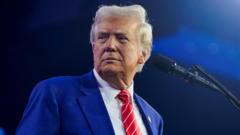In a show of unity, Germany and France have issued stern warnings to U.S. president-elect Donald Trump, urging him to back away from any militaristic threats regarding Greenland. After Trump reiterated his belief that the Arctic territory is integral to America's national security, German Chancellor Olaf Scholz and French Foreign Minister Jean-Noël Barrot reiterated the principles of territorial integrity and the protection of sovereign borders.
Germany and France Warn Trump: No Military Moves on Greenland

Germany and France Warn Trump: No Military Moves on Greenland
World leaders express strong opposition to US president-elect’s comments on Greenland's sovereignty.
Germany’s Chancellor Olaf Scholz emphasized that, regardless of a nation’s size, the principle of inviolable borders must be upheld. This comes after Trump’s comments raised alarms, suggesting he would not rule out military action to secure Greenland. Meanwhile, Denmark, an ally of the US, firmly stated that Greenland is not for sale, affirming that the island belongs to its residents. Danish Prime Minister Mette Frederiksen noted that the future of Greenland lies with its people.
Scholz expressed bewilderment at Trump’s statements, affirming that NATO remains central to transatlantic defense relations. Barrot also dismissed the notion of a US invasion, but acknowledged concerning global trends that could trigger conflict.
Trump’s repeated interest in acquiring Greenland stems from its strategic military significance and mineral resources, which are deemed essential for economic and defense needs. Despite the local government advocating for a dialogue on partnerships, they maintained that their sovereignty is non-negotiable.
Greenland's prime minister, Mute Egede, is fighting for greater independence and strongly rejected outside claims of ownership. With mounting tensions, analysts fear these remarks might escalate into a larger international crisis.
As Trump’s administration prepares to take office, the global community watches closely, noting the implications of his foreign policy stance. Further, his son, Donald Trump Jr., recently visited Greenland, further fueling speculation and concern regarding the US's long-term intentions for the territory.
Scholz expressed bewilderment at Trump’s statements, affirming that NATO remains central to transatlantic defense relations. Barrot also dismissed the notion of a US invasion, but acknowledged concerning global trends that could trigger conflict.
Trump’s repeated interest in acquiring Greenland stems from its strategic military significance and mineral resources, which are deemed essential for economic and defense needs. Despite the local government advocating for a dialogue on partnerships, they maintained that their sovereignty is non-negotiable.
Greenland's prime minister, Mute Egede, is fighting for greater independence and strongly rejected outside claims of ownership. With mounting tensions, analysts fear these remarks might escalate into a larger international crisis.
As Trump’s administration prepares to take office, the global community watches closely, noting the implications of his foreign policy stance. Further, his son, Donald Trump Jr., recently visited Greenland, further fueling speculation and concern regarding the US's long-term intentions for the territory.






















